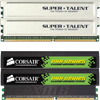- Qualcomm Launches Snapdragon 4 Gen 2 Mobile Platform
- AMD Launches Ryzen PRO 7000 Series Mobile & Desktop Platform
- Intel Launches Sleek Single-Slot Arc Pro A60 Workstation Graphics Card
- NVIDIA Announces Latest Ada Lovelace Additions: GeForce RTX 4060 Ti & RTX 4060
- Maxon Redshift With AMD Radeon GPU Rendering Support Now Available
4GB Trials and Tribulations

Have you ever wondered what it would be like to move on up to 4GB of system ram? There may not be a need for that now, but it won’t take very long until it’s commonplace in enthusiast PC’s. I take 4GB worth of top end DDR1 and DDR2 memory, and relate my overclocking and performance reports to you.
Page 3 – General OC’ing with 4GB
Most computer enthusiasts enjoy knowing their computers are running at the fastest speed possible. This of course means overclocking the CPU, GPU and memory is on the top of their lists. The question is, is overclocking 4 * 1GB the same as 2 * 1GB? The answer is, yes and no. There have been a lot of yes and no answers today :)
Overclocking the memory with each configuration is exactly the same, the process at least. But, say for instance you have a DDR500 2 * 1GB kit, that easily overclocks to DDR550 speeds. Can you expect to have the same DDR550 speeds in a 4 * 1GB configuration? This again depends entirely on the modules, and your memory controller. Your motherboard can play a huge role also, though.
The first problem is whether the memory controller can handle overclocking four modules at once. Simply, it may prove to be too much strain, so you could be forced with stock speeds. You will have better success with a higher quality motherboard and CPU, but still nothing is guaranteed.
The problem is harder if you want to overclock two different types of memory. For instance, there are some out there who may currently have a 2 * 1GB kit in their computer, and find another kit on eBay for a great price, so they snatch it up. If all four modules are *identical*, then your chances of a decent or good overclock are great, as long as your memory controller can keep up. If you have two different 2GB kits though, the chances of a good overclock are around 25%.
First thing to take into consideration, is that two different kits of memory may have completely different chips. One may use Infineon, the other Micron. Because of the differences, your overclock probability is not as great as if the chips were all the same. Let’s take another example… you have two separate kits that both use Micron 5b F chips, but one kit is by OCZ and the other Corsair. This is completely a random analogy, because Corsair hasn’t released anything with these chips, so this is merely an example.
It’s up to the memory manufacturer to decide on SPD timings, which are the ‘base’ timings and configuration on the chips. One of the kits may have an SPD timings of 200MHz at 2.5-3-3-8, while the other 200MHz at 3-3-3-8. These minor differences can make a huge difference in whether you will have a successful overclock or not.
So, the moral of this story is that in order to have the *best* possible chance of a good 4 * 1GB overclock is to have 4 identical sticks. If you are a poor sap with 2 different kits as mentioned in the previous example, steps can be taken to manually change the SPD timings on one kit to match the other. This is currently only possible on DDR1, unless you have the hardware to change the timings on DDR2, which you don’t ;)
Manually changing SPD’s is dangerous though, so I am not going to give even a simple how-to on it.
|
|
Support our efforts! With ad revenue at an all-time low for written websites, we're relying more than ever on reader support to help us continue putting so much effort into this type of content. You can support us by becoming a Patron, or by using our Amazon shopping affiliate links listed through our articles. Thanks for your support!





